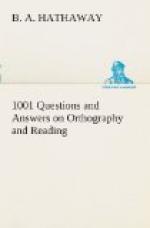200. What effect do Stimulants have
on the voice?
Irritate and inflame the vocal organs,
which results in
hoarseness
and produces too high a key, which terminates in a
squeaking
tone.
201. In faulty articulation what sounds
are usually mispronounced?
The vowel sounds of the unaccented syllables.
202. What Consonants are often incorrectly
dropped?
The final consonants.
203. How may distinct Articulation
be acquired?
By continued practice of the elementary
sounds.
204. What are the most prominent Elements
of all words?
The vowels.
205. Which sounds should be practiced
first?
The vowels; as they are the most easily
uttered.
206. Can the sounds of the Consonants
be given alone?
They can by practice.
207. What is the source of the greatest
defect in Articulation?
Improper sounding of the consonants.
208. What kind of Inflection is generally
given to words of great
emphasis?
The falling; unless the sentiment requires
the rising.
209. When is the Inflection of a question
changed from the
falling
to the rising?
When it is repeated or made emphatic.
210. In the introductory part of a
sentence, where the sense is
incomplete,
what inflection is used?
Unless great emphasis is required, the
rising should be used.
211. The names of persons addressed
in formal speech require what
inflection?
The falling should always be used in such
cases.
212. General statements require what
inflection?
The falling.
213. For the sake of harmony, what
principle should govern the
reader?
When a sentence ends with the falling
inflection, the rising
should
precede it.
214. When sentences commence with verbs,
what inflection is
required?
Mostly the rising.
215. What is meant by an Echo in reading?
Interrogative exclamations, where the
question is repeated.
216. Give an example of Echo.
What’s the trouble? What’s
the trouble? trouble enough.
217. What inflection should be given
to members of sentences
connected
disjunctively?
First member, the rising; second member,
the falling.
218. When several Emphatic words or
members come together, how
should
they be inflected?
The most emphatic, the falling; and the
others the rising.
219. What is a Simple Series in reading?
A series of particulars that is composed
of single words.
220. What is meant by a Compound Series?
One that is composed of clauses is called
compound.




